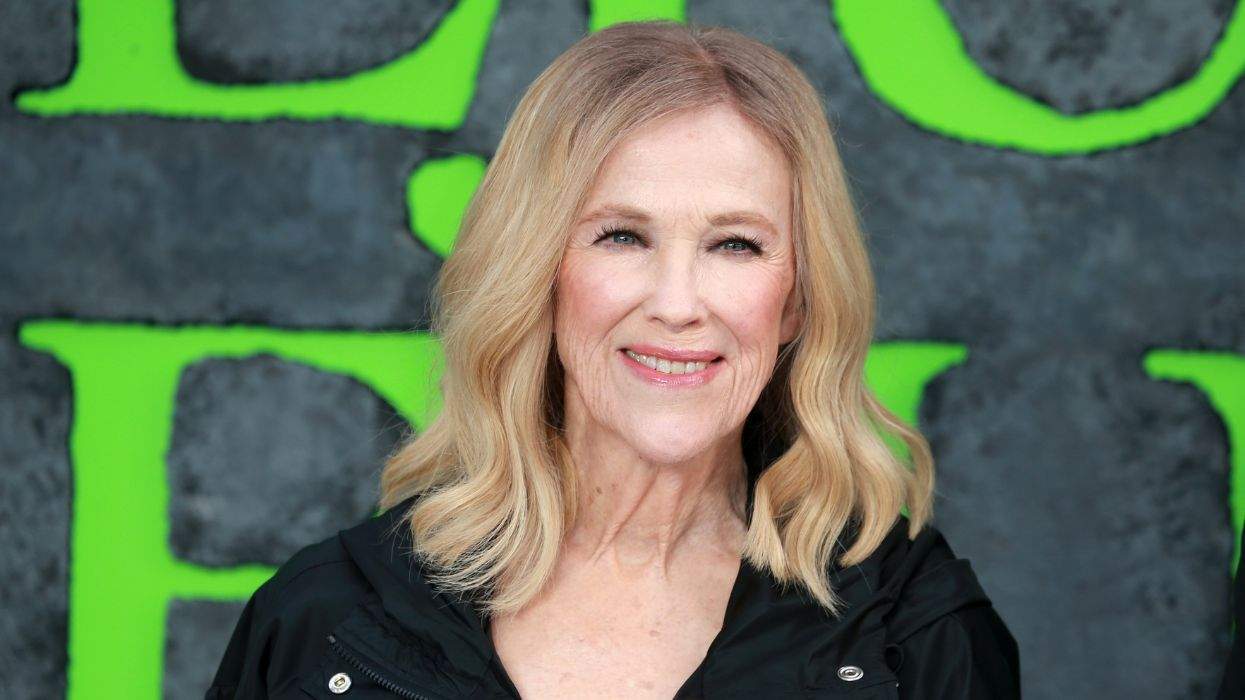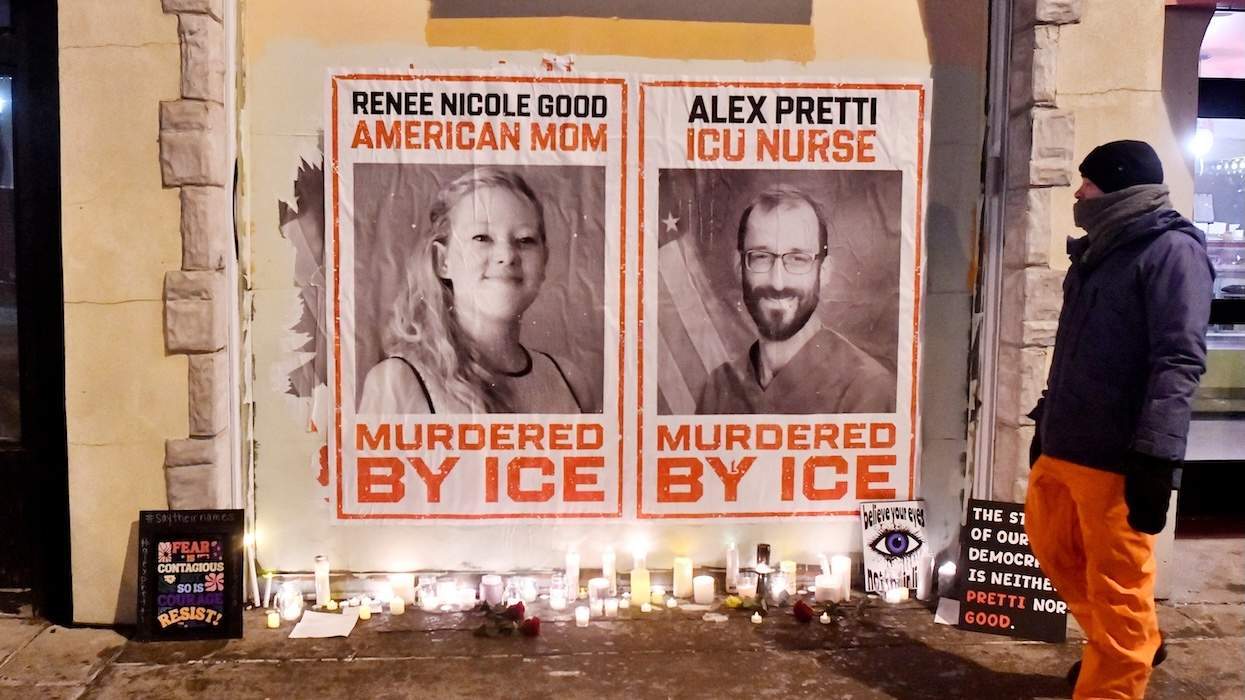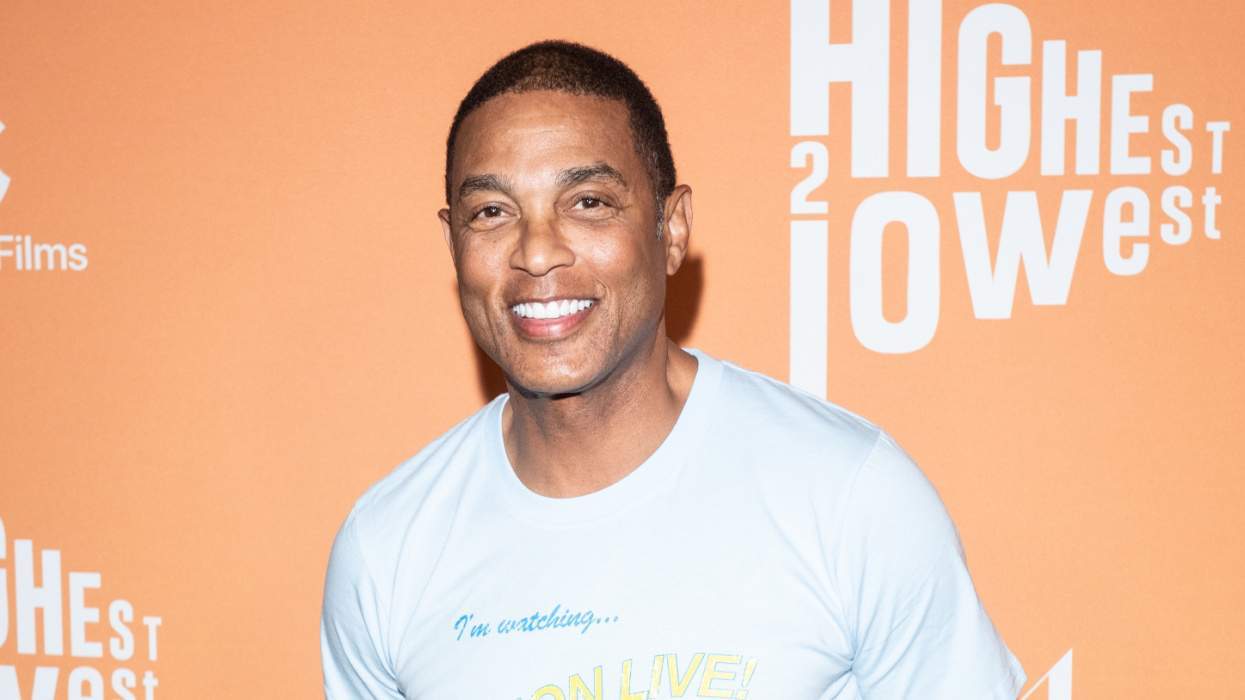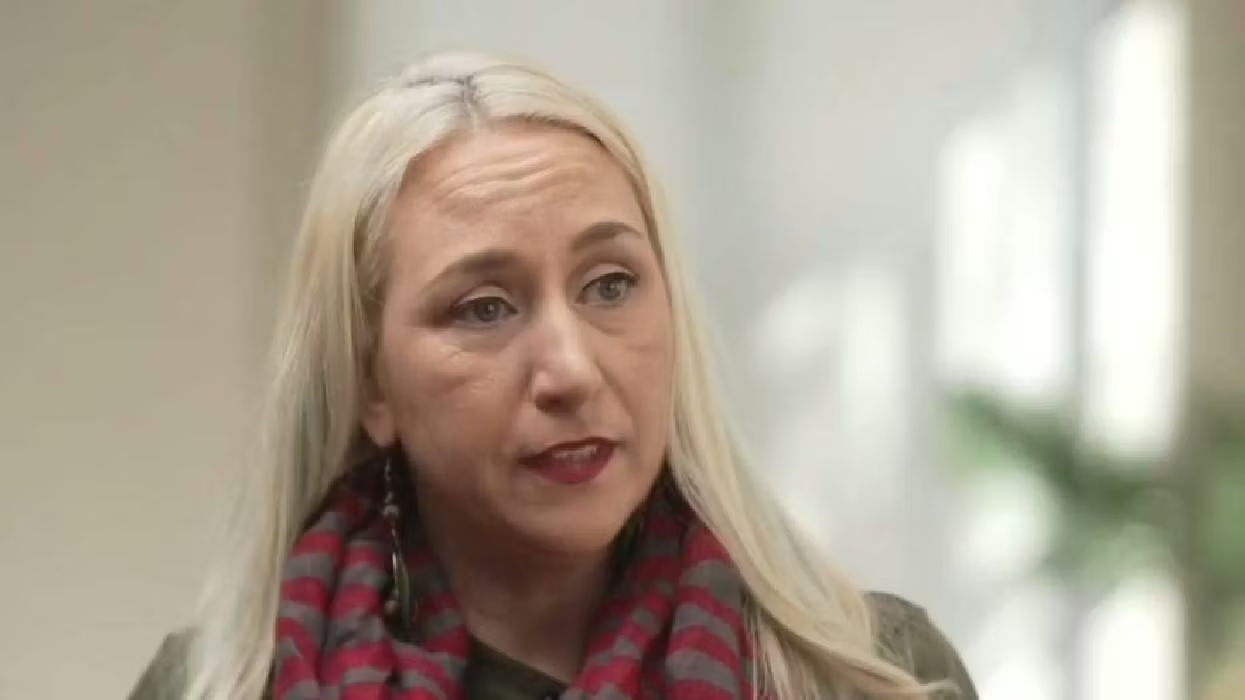When k.d. lang last put out an album of original songs, she hadn't yet turned 40 years old. September 11th, iTunes, and A Shot at Love With Tila Tequila hadn't happened. Ellen DeGeneres was still dating Anne Heche, and nobody had even heard of a "hanging chad."
While she never stopped making music -- she has done a live set, duets with Tony Bennett, and a tribute album to fellow Canadian singer-songwriters like Leonard Cohen and Joni Mitchell -- it does seem like lang, the formerly ubiquitous dashing crooner who gave queerness so much of its voice in the '90s, has been conspicuously quiet this decade.
Tucking herself into the far corner of a brown couch in the midtown Manhattan office of her record company on a December afternoon, lang isn't evasive about what she's been up to since releasing the sunny, enthusiastic Invincible Summer in 2000.
"Buddhism, number one, has had a huge, huge, huge impact on my life and my direction," she says, unconsciously toying with a string of brown prayer beads on her left wrist. Lang became a serious practitioner in 2001, and everything from her lingo and demeanor to the music on her new genre-spanning album, Watershed, demonstrates her devotion. It's no passing Hollywood fancy. "It took a long time to get to a point where I knew what I wanted to express as a lyricist," lang says.
The outside world may be rumbling with turmoil, but the 46-year-old lang radiates peace. Her unlined face is still sweetly boyish, and her cropped hair points effortlessly skyward. She wears a baggy dark sweater over a plain T-shirt and speaks with an appealing melodic lilt about her nearly quarter-century-long career. Watershed, an album of beautifully orchestrated, slow-burning adult-contemporary pop songs, marks her first self-produced project and her second album on Nonesuch, the less commercially oriented Warner Bros. label devoted to jazz and world musicians as well as category-defying artists like Wilco and Radiohead's Jonny Greenwood.
"I'm extraordinarily grateful and proud that after 25 years I am sitting in a room with you and talking about my music and my life, and next door I have a record company that's there to support my art and doesn't have sales expectations of me," says lang. While the music industry seems continually fixated on moving units, she jokes, "fortunately, that's never been my karma, to sell a lot of records." That's not to say she doesn't have real aspirations. "I completely plan on becoming Tony Bennett," she says. "I have always designed my career and my lifestyle around the fact that I want to be making records when I'm 70."
When she released her first album in 1984, lang was a Patsy Cline-adoring art-school cowgirl from small-town Canada who was hell-bent on punking the uptight country establishment. When that community turned on lang over her public service announcement for People for the Ethical Treatment of Animals condemning the meat industry, she was already well on her way to her next creative stage: opening up her velvety voice to mature pop and torch songs. By the time she came out in these pages while promoting her 1992 platinum album Ingenue, lang was an object of musical and sexual curiosity. It was a role she embraced with gusto--notably evidenced by her iconic gender-bending Vanity Fair cover, her penchant for rolling with the L.A. in-crowd, and her reputation as a debonair lady-killer.
There were, however, repercussions. "There was probably 15 years of focus on my sexual orientation over my music," she muses. "I think that's changed now. My fan base has grown up with me, and the attention on my sexuality and me as a sexual being or a sex symbol or whatever -- the superficial sexual front of being a celebrity -- has dissipated as well. Which is kind of a relief."
Really? Could the k.d. lang who built her career in part by playing with the politics of desire be retreating from her famous libido? Putting the craving on the back burner?
"Yeah, really. As titillating as it can be, it's a bit objectifying," she explains, comparing the rush of fame to a sugar overdose. "It got a little trying. I don't mean to be above human desire, because I'm certainly not, but as much as was made of sexual beingness, it's not really that important to me. Certainly my focus has shifted on to more introspective, spiritual matters."
Buddhism has given lang not only a new perspective but a new love. (Lang and musician-actress Leisha Hailey, the subject of Invincible Summer, broke up shortly after that album's release.) Attorney Jamie Price, lang's partner of more than six years, works full-time on projects like Tools for Peace, a nonprofit art education program based on Tibetan principles of compassion and wisdom. The curious keep asking, so lang reiterates that she has no interest in having kids. "The culture of having children right now is a little out of control. It seems vaguely self-absorbed," she explains. "Sometimes I think we just jump on these ideas of what makes us attractive and accepted in society, and I think our motivation is miscued."
In 2004 lang expressed a similar sentiment to The Advocate about gay marriage. "If someone wants to get married, they should be able to," she said. "I don't necessarily feel that it's in the gay and lesbian culture's best interest to try to model themselves after a straight institution."
So we know lang hasn't been on an extended honeymoon or trolling fertility clinics in the seven years between Invincible Summer and Watershed. But what has she been up to? "I watch football, I ride my motorcycle, I play with my dogs," she says, noting that she hunkered down as usual to write the new album but gave up the pot smoking that had seen her through previous efforts. In April 2007 a two-year-long lawsuit against her former manager concluded with lang winning a judgment of nearly $2 million in mismanaged funds. But her mind has clearly been on less career-oriented matters. "I spend probably over half my time volunteering and working on my Buddhist activities," she says. "Everything from cleaning toilets to fund-raising to putting up drywall." Yes, folks, Grammy winner k.d. lang scrubs bathrooms in her spare time. "It's very Buddhist," she chuckles. "It's about not seeing the difference between any of those things."
Perhaps because most people don't hang drywall in sharply tailored three-piece suits, lang has seen her relationship to the world of haute couture undergo a significant shift over the past decade as well. "I'm taking a more utilitarian view of fashion these days," she admits, glancing at her relaxed attire. "I've always tried to create androgynous ways of dressing. Even though I love dressing in drag, it's not always what I want to do, and the women's fashion thing isn't an option. It's something that I grapple with consistently, though I love wearing men's clothes. I feel most comfortable in them.
"I used to be quite flamboyant with my fashion and used fashion to embellish my music," she continues. "I've found that I get kind of bored of doing men's suits. I'm not an easy fashion body: I'm big, and then there's the gender issue." Lang doesn't speak out much about her weight gain, which has been noticeable enough to grab the fascination of her message-board devotees and the New York Post's Page Six gossip column. Her appearance began to change around the time of Invincible Summer's release, approximately the same time she began to retreat from the red-carpet scene, and one year before she embraced Buddhism. And while lang says she's grown out of the phase of her life when she was so powerfully in control of her sexual identity, she doesn't address whether she literally grew out of that role. It's clear she believes Buddhism has given her body a new purpose as she grapples with a dilemma that faces every musician who's fortunate enough to last more than 20 years in the industry: how to grow old gracefully in a business that trades on youth and sex appeal.
Fiddling with a pair of glasses that never find their way to her face, lang continues to ignore the fruit and cheese her handlers have ordered to keep her fueled as she winds down from a long day of Watershed press. She's noticeably tired but seems unflappably serene.
American cultural shifts over the past seven years notably include the lingering question of the music industry's viability, the relevance of the album, and the cult of music celebrity. To which lang simply shrugs. "I don't feel precious," she says. "I don't care if you listen to all 12 songs at one time." As for gossipmongers outing former boy-band members, she says simply, "Of course we all know there are country stars who are gay, there are ministers that are gay, and there are probably presidents who are gay -- or soon-to-be presidents who may be gay or lesbian." She pauses to laugh, then continues, "I think everybody knows from their own vast internal sexual desire and fantasies that it is not an easy thing to figure out."
Though her equanimity smells slightly political, lang is anything but these days. Her early misadventure with PETA taught her a valuable lesson: "You can't be left enough. Even Dennis Kucinich isn't left enough," she chuckles before returning to her Buddhist teachings. "The middle ground is a better place to reside because it forces you to open up. It takes a lot more work to really examine and be compassionate to both sides of the story." She adds that she hopes gays and lesbians will become leaders in compassion, "because we've been oppressed and we know what it's like to be on the sharp end of the stick." Speaking about the contention between the black and gay communities, a rare flash of anger darts to the surface: "That drives me absolutely mental, when a culture of people who have been so demonized and culturally oppressed turns around and oppresses another culture."
When Madonna's publicist bursts into the room to exchange hugs with lang, the singer's brief moment of outrage ends. After all, Watershed is about lang's internal relationships with her girlfriend, her music, and her spirituality. For instance, the song "Flame of the Uninspired" explores how artists seek out chaos or destruction for inspiration, which lang now realizes is "a complete waste of energy." Overall, the ballad-heavy album is far less upbeat than the slick Invincible Summer, settling on a slower-paced, more sophisticated and pensive aesthetic. The record is a fairly faithful stroll through lang's career: A twangy steel guitar on opener "I Dream of Spring" hearkens back to lang's country roots, "Sunday" boasts a jazzy swing, and a few gentle electronic thumps embellish "Upstream." The music never works itself into a lather, and neither do lang's lulling lyrics, which are mostly preoccupied with finding clarity and conjuring scenes of romantic contentment.
The album so strongly echoes the singer's tranquil mind-set you have to wonder whether this peace and serenity amounts to true happiness for lang. "I think it's the most stable I've been," she says, skillfully readjusting the words. "I feel very comfortable as a queer in society right now. I know it's not like that for everyone -- I'm not that naive -- but I think it's better for a lot of people." She's careful not to disown her past, but it's clear that the philosophy that guides her present has shifted lang's consciousness and her art in innumerable ways -- and provided a cushion between her psyche and the wearying events of the past seven years.
"Buddhism is sort of what Prozac wants to be," she says with a grin. "It just puts emotions into perspective and compresses them [so they're] not so polarizing and not so extreme. And I think that's a really good thing for me." But is a k.d. lang with her edges buffed off good for the rest of us? That's one question that can't be answered by the Four Noble Truths.















